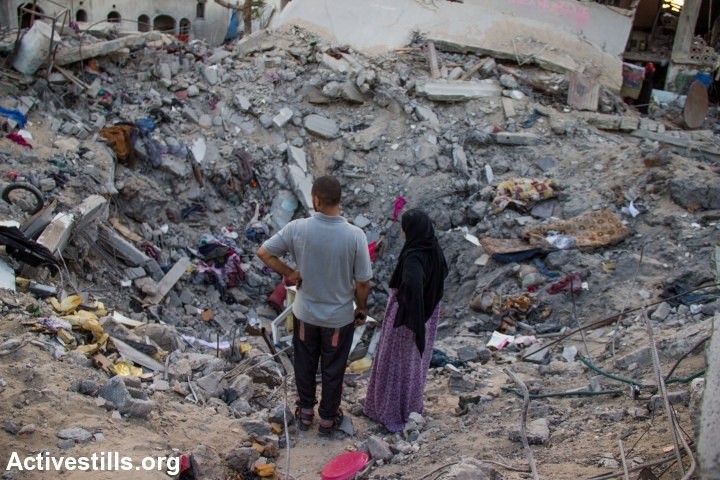The magnitude of the destruction, the high death toll and trauma caused by the recent round of fighting in Gaza and Israel serve as a painful reminder that the Gaza closure, beyond its moral failings, has failed to achieve its goals. Gisha publishes a new position paper calling on Israel to end the closure and cancel the separation policy.

Destruction in Beit Hanoun following bombardment by Israeli forces, North Gaza Strip, August 11, 2014. During the last Israeli attack, 16,800 Homes in the Gaza Strip have been destroyed or severely damaged and 370,000 displaced (Photo: Activestills)
According the position paper: “Up until the fighting began, Israel imposed restrictions on civilian movement to and from Gaza, including restrictions on travel between Gaza and the West Bank, a ban on marketing of goods from Gaza to their primary markets in Israel and the West Bank and restrictions on the entry of construction materials.” These restrictions were ostensibly predicated on security needs and threats Israel faces from Hamas and other armed groups in Gaza, but they have far exceeded what was required for security, violating the rights of the civilian population and damaging Gaza’s economy.
Israel has a right and indeed an obligation to protect its citizens from security threats originating in Gaza and, for this purpose, may impose restrictions on access through the border crossings under its control. However, not every restriction is permitted. The Gaza closure does not distinguish between civilians and combatants and violates the rights and needs of 1.76 million Palestinian residents of the Strip, most of who are children. The civilian closure is incompatible with Israel’s obligations under international law and does not contribute to the security of its citizens. It is time for it to end.
Lifting the closure would make normal life possible: students from Gaza would be able to study in universities in the West Bank; construction workers would be able to make a living and rehabilitate Gaza; individuals would be able to reunite with relatives they have not seen for years, businessmen and women would be able to develop their businesses and access professional opportunities; farmers would be able to sell their produce and provide for their families. Improving conditions for the civilian population in Gaza does not necessitate compromising Israel’s security needs. On the contrary, in the long run, it is the only way to achieve sustainable security in the region.
Israel must abandon the “separation policy”, which splits Gaza and the West Bank and denies travel between the two parts of the Palestinian territory. Subject to suitable security arrangements, it must once again permit the transit of Gaza-made and grown goods to their markets in Israel and in the West Bank, and must allow Gaza residents, in the public and private sectors alike, to purchase construction materials.
Related: The full position paper (5 pages, English)
http://gisha.org/UserFiles/File/publications/newpage/new-page-en.pdf


